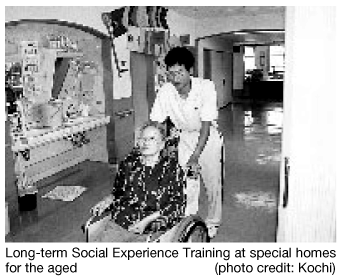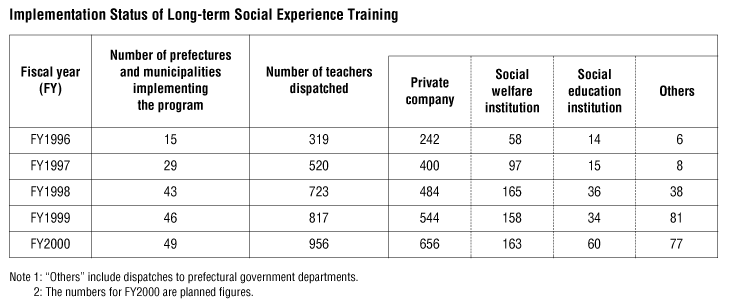| Home > Policy > White Paper, Notice, Announcement > White Paper > Japanese Government Policies in Education, Culture, Sports, Science and Technology 2001 >EDUCATIONAL REFORM Q&A Q9 | ||
|
Educational achievements are very dependent on the quality and ability of teachers. What kind of effort is being made to improve teacher qualification and ability?
Since FY2001, Long-term Social Experience Training has been expanded to broaden teachers' outlook and the Leave for Graduate School Study started to support teachers' self-initiated training.
The Law Concerning Organization and Functions of Local Educational Administration was partly amended in June 2001, and as a result, it made possible the transfer of a municipal elementary or lower secondary school teacher who offered improper guidance to students to a prefectural position outside the teaching profession. The amendment is scheduled to take effect in January 2002.
|
| Improvements in Teacher Qualifications and Ability |
Needless to say, school education achievements are quite dependent on a teacher being directly engaged in a student's educational activities. The quality and ability of teachers are supposed to improve at each phase, including university education, appointment and in-service training, as well as through daily educational activities.
At each phase, various education and training for teachers has been systematically conducted. Teachers are expected to offer school education that develops children's "zest for living," such as the ability to learn and think on their own and enriched humanity for the coming times.
In order to do so, each teacher is required to have broad perspectives and make efforts to bring out the strengths of each student. MEXT, in response to such needs, has been taking the following measures.
| Expanding Long-term Social Experience Training |
As teachers are members of society, they are required to have a broad outlook. This is even more necessary, given the rapid changes that are occurring in society.
Long-term Social Experience Training is a program to meet this demand. It dispatches a teacher to an establishment other than a school, such as a private company, social welfare institution or social education institution, for a term lasting from about one month to one year. Recently, more and more local governments across the nation have implemented the program, which covered 956 teachers in FY2000. Long-term Social Experience Training has greatly contributed to improvements in the ability of teachers to acquire wider perspectives and have better communication skills. MEXT has tried to expand the program by extending relevant support to local boards of education since FY2001.
| Leave for Graduate School Study |
The Leave for Graduate School Study allows teachers of national and public schools to take leave for a certain period to study at a graduate school in or outside of Japan. Teachers are thus given an opportunity to study educational issues that they have come to find through their actual teaching experiences. The amendment to the Special Law for Education Officials established this system in April 2000 and it went into effect in April 2001.
As of 2 April 2001, 155 teachers were taking graduate school courses under this system.
More teachers are expected to take advantage of this system to further advance their self-initiated training, which is the very purpose of the system.
| Transfer of Teachers Giving Improper Guidance to Students |
A teacher's job is related to the formation of a student's personality. Therefore, a teacher's improper guidance to a student is detrimental to a student's life and shakes the confidence in a school on the part of parents, guardians and even the local community.
Boards of education of prefectures and designated cities, which have the power to appoint teachers, should improve teacher qualifications and ability through university education, recruitment and in-service training to prevent a teacher from giving inappropriate instruction to his or her students. If a case of improper guidance by a teacher actually occurs despite such efforts, authorities should take the necessary measures to correct the situation promptly through the teacher's continuous instruction and training and if necessary, by taking disciplinary actions such as dismissal from his or her job.
It is sometimes necessary to prevent a teacher giving inappropriate instruction from performing his or her duty as teacher even if the case does not meet conditions for disciplinary action.
In such cases, the June 2001 revision of the Law Concerning Organization and Functions of Local Educational Administration made possible the transfer of a municipal primary or lower secondary school teacher to a prefectural government position other than teaching. This revision will go into effect in January 2002.


| Back To Top | MEXT HOME |